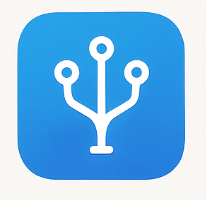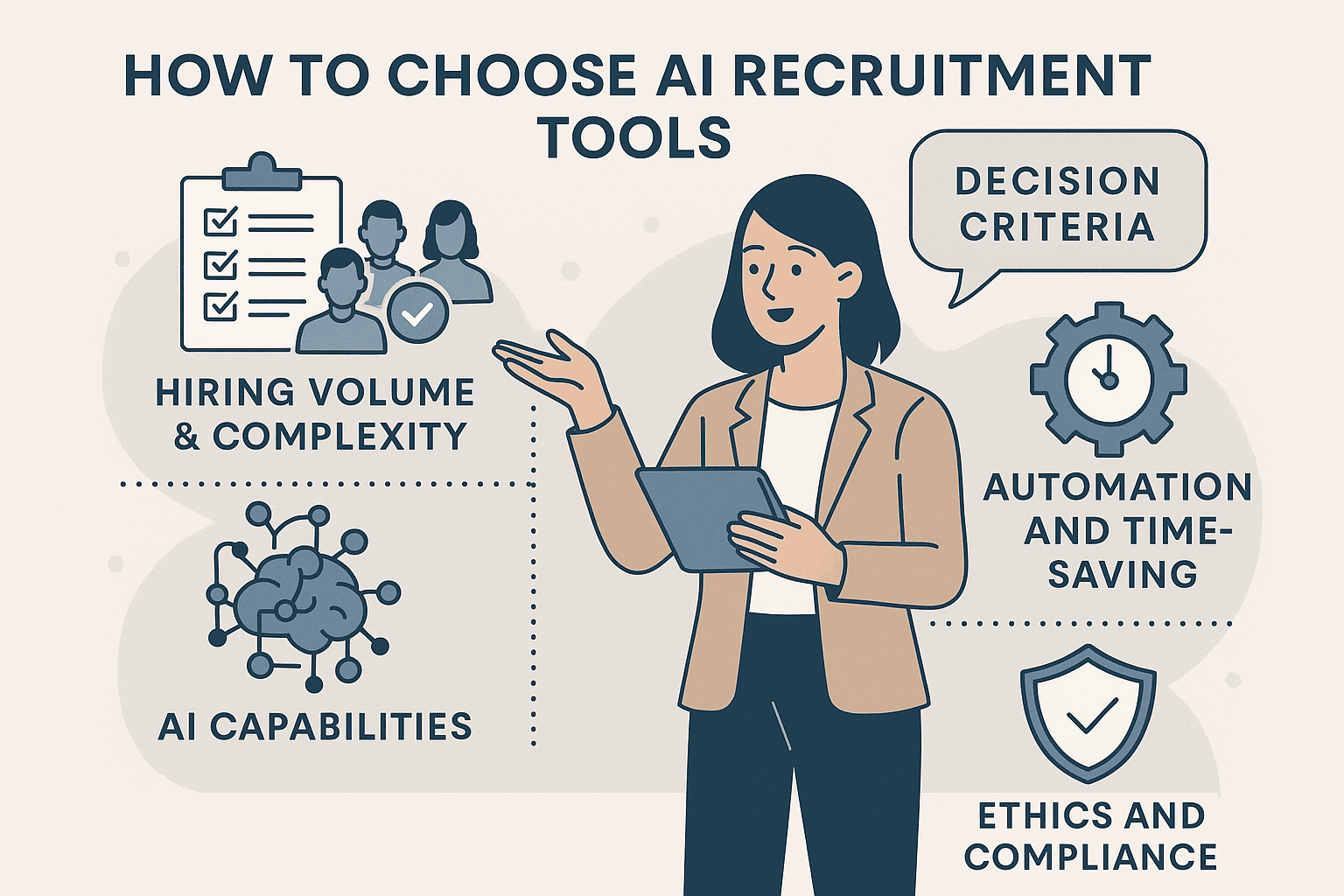Hiring in 2025 demands more than just speed — it demands accuracy, fairness, and a great candidate experience. Recruiters today are juggling more roles, more applications, and higher expectations than ever before. AI recruitment tools are no longer just helpful — they’re essential.
But with so many AI tools available, how do you choose the one that will truly enhance your hiring process?
This guide will walk you through:
-
How AI enhances modern hiring
-
Key features to look for in AI recruitment software
-
The best tools based on hiring needs
-
A decision-making framework to find your perfect fit
How AI Is Changing the Game in Recruitment
AI recruitment tools are designed to handle repetitive tasks, analyze large amounts of candidate data, and offer insights that improve hiring decisions. But the real impact is strategic:
1. Faster Shortlisting
AI tools can instantly scan hundreds of resumes and match them against job descriptions using natural language processing. This reduces screening time from days to minutes.
2. Improved Quality of Hire
By analyzing past performance data, skills, and behavioral indicators, AI suggests candidates most likely to succeed in a role — not just those with the right keywords.
3. Reduced Bias
Algorithms can be trained to ignore personal identifiers like gender or ethnicity and focus only on job-relevant data, supporting more equitable hiring.
4. Enhanced Candidate Experience
From chatbots that answer questions in real-time to automated scheduling, AI tools offer faster, smoother interactions for applicants.
What to Look for in an AI Recruitment Tool
Before jumping into specific tools, it’s important to know what to evaluate. Here are five decision criteria to guide your selection:
🔍 1. Your Hiring Volume and Complexity
Are you hiring for 3 roles a month, or 300? The scale and diversity of your roles will determine whether you need lightweight automation or an enterprise-level suite.
-
Low volume, diverse roles? → Look for flexible AI scoring and CRM tools
-
High volume, consistent roles? → Prioritize automation and bulk processing
🧠 2. AI Capabilities That Go Beyond Keywords
Look for tools that offer:
-
Contextual resume parsing
-
Predictive analytics on candidate fit
-
Behavioral or video-based assessment scoring
-
AI-powered job-candidate matching
These features help you go from filtering resumes to forecasting success.
🤖 3. Automation and Time-Saving
Does the tool help with:
-
Scheduling interviews?
-
Sending follow-up messages or emails?
-
Answering candidate FAQs?
These automations save time and reduce drop-offs in your pipeline.
📊 4. Analytics and Reporting
You want visibility into:
-
Where candidates are dropping off
-
Which channels produce the best talent
-
Time-to-fill and conversion rates
Choose a tool that gives you dashboards or exports to support continuous improvement.
🔐 5. Ethics, Bias Prevention, and Compliance
In 2025, ethical AI is no longer optional. Make sure the tool:
-
Complies with privacy laws (GDPR, PIPEDA, etc.)
-
Has explainable decision logic
-
Offers bias audits or fair hiring checks
Tool Highlights: What’s Best Based on Your Hiring Needs?
Let’s map some of the top tools against different hiring goals.
🏢 Best for Enterprise Hiring: HireVue
If you’re managing hundreds of applicants and want structured, scalable interviews, HireVue stands out. It uses AI to evaluate video interviews based on tone, language, and facial expressions (with ethical oversight). Great for replacing phone screens at scale.
✅ Use it for:
-
Volume-based hiring
-
Video assessments
-
Early-stage screening
💬 Best for Candidate Experience: Paradox Olivia
Want to improve your employer brand without hiring more recruiters? Paradox offers a conversational AI assistant that acts like a 24/7 recruiter. It schedules interviews, answers questions, and keeps applicants updated.
✅ Use it for:
-
Retail or campus hiring
-
Mobile-first applications
-
Candidates needing quick responses
🧰 Best for All-in-One + ATS: Manatal
Manatal is perfect for teams that want an ATS with strong AI suggestions. It ranks applicants based on job requirements, integrates with LinkedIn, and adds social insights — all from one dashboard.
✅ Use it for:
-
Small to mid-size teams
-
Agencies managing multiple clients
-
First-time AI users
🔬 Best for Deep Candidate Insights: SeekOut
If you’re focused on technical talent or DEI hiring, SeekOut provides powerful search filters, GitHub analysis, and competitor intelligence. Great for specialized or hard-to-fill roles.
✅ Use it for:
-
Engineering, R&D, or executive roles
-
Diversity recruiting
-
Strategic talent sourcing
⚙️ Best for Automation and Outreach: Fetcher
Fetcher is like a recruiter that never sleeps. It finds profiles that match your criteria, sends them personalized outreach emails, and even follows up automatically.
✅ Use it for:
-
Passive sourcing
-
Fast-growth startups
-
Filling many roles quickly
A Quick Comparison Table
| Tool | Best For | Standout Feature | AI Strength |
|---|---|---|---|
| HireVue | Large-scale screening | Video-based candidate analysis | Communication scoring |
| Paradox | Experience & mobile | Conversational chatbot assistant | Real-time interaction |
| Manatal | Budget + ATS | Built-in CRM & AI matching | Smart scoring engine |
| SeekOut | Niche/technical roles | Deep profile insights & diversity | Sourcing intelligence |
| Fetcher | Outreach automation | Candidate sourcing + drip email | Full automation |
Choosing the Right Tool: A Decision Framework
Here’s a step-by-step guide to match your business to the right solution:
-
Audit Your Hiring Process
Where is time wasted today? Resume screening? No-shows? Low-quality applicants? -
Rank Priorities
Are you optimizing for speed, quality, cost, or DEI goals? -
Try Before You Buy
Most platforms offer demos or free trials. Test how the AI actually impacts your shortlist or scheduling workflow. -
Involve Stakeholders
Include hiring managers and even candidates in feedback loops. A tool that saves recruiter time but confuses candidates may hurt long-term. -
Review Compliance & Bias Tools
Make sure you’re not trading efficiency for legal risk.
Final Takeaway: AI as a Strategic Hiring Partner
Choosing the right AI recruitment tool isn’t just a software decision — it’s a strategic move that impacts your entire talent pipeline.
The right tool can:
-
Help you hire faster and smarter
-
Improve equity and fairness in the process
-
Free up recruiters to do more meaningful work
-
Make your employer brand more attractive
In 2025, the best hiring teams aren’t just working harder — they’re working smarter with the right AI on their side. check our article Beyond Hiring: How AI Is Revolutionizing Talent Management in 2025


Laisser un commentaire